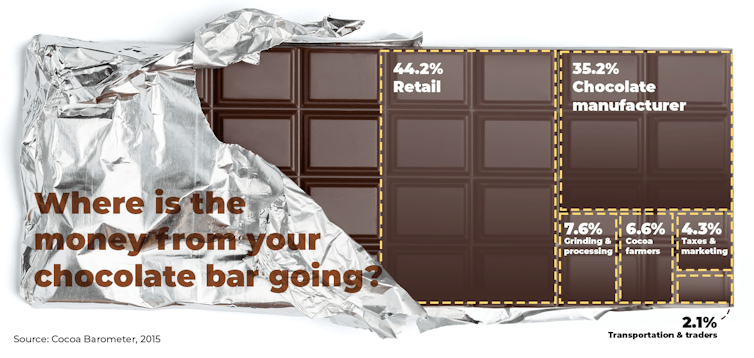Each Easter we spend about $62 a head on chocolates, but the cost of buying unsustainable products can be far greater
- Written by Stephanie Perkiss, Associate professor in accounting, University of Wollongong

Australians enjoy chocolate, consuming on average the equivalent of 32 kilograms a year, but there is growing interest in its origins and how it’s made.
They want to know their product is sustainably made by companies that only deal with ingredient suppliers who engage in fair labour practices and safeguard against deforestation and other environmentally damaging processes.
But according to the 5th Edition of the Chocolate Scorecard, produced by Be Slavery Free, two Australian universities and several sustainability interest groups, some retailers are lagging when it comes to stocking sustainable products.
The scorecard is released at Easter, the busiest time of the year for the sweet treat. Sales in this period account for 75% of chocolate sold annually in Australia, with the average consumer spending $62 on Easter chocolates.
The scorecard ranks the policies and practices of chocolate traders, manufacturers, brands and retailers, assessing 63 companies on six criteria. These are traceability and transparency, living income, child and forced labor, climate change and deforestation, agroforestry and agrochemical use.
Next year’s report card will also include a rating based on gender equality which is being added as a seventh criteria.
It assesses companies deemed industry leaders in sustainable policies and practices and awards them a green rating (or “egg”), while yellow and orange ratings are given to companies considered to be “progressing” and “needing improvement”. Red is given to those “trailing in policy and practice” and grey indicates a lack of transparency.
This year, the German brand, Ritter Sport, available in some large Australian supermarkets, was given a Good Egg Award in the medium and large company category for its progress and to show bigger companies can do much better.
Dutch brand, Tony’s Chocolonely, was given a special achievement award in the same category for consistently rating green. New Zealand manufacturer Whittaker’s was a highly rated yellow.
Mars Wrigley (maker of Mars bars, Snickers, Milky Way and Twix) rated strongly among the world giants of chocolate, followed by Nestle (Kit Kat, Smarties), Hershey’s (Kisses, chocolate syrup) and Ferrero (Nutella, Kinder, Ferrero Rocher), all of which received yellow awards.
Lindt and Mondelēz, whose portfolio includes Cadbury, Toblerone and Green & Black’s, received orange, indicating the need for improvement.
Globally, no retailers were rated green. Of the stores operating in Australia, Aldi (run by Aldi Sud), received yellow while Woolworths (including Big W) scored a disappointing orange. This was followed by red recipients Coles, David Jones and Kmart.
Chocolate is a growing business
Global revenue from chocolate is expected to reach US$254 billion in 2024. Around US$3.5 billion is generated in Australia and this is expected to grow by nearly 8% over the next few years.
According to the United Nations Guiding Principles on Business and Human Rights, a business is responsible for any and all adverse human rights impacts either through their or their suppliers’ activities. Responsibility should not be shifted to another level in the supply chain.
Research on retail stores reveals confectionery is often an impulse purchase. Stores stock sweet products at payment areas, setting a high profit margin. These products can financially make or break a retailer.
So when a retailer sells chocolate, they have a responsibility to address human rights and environmental issues.





